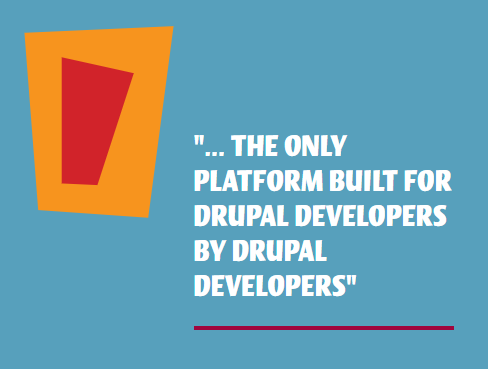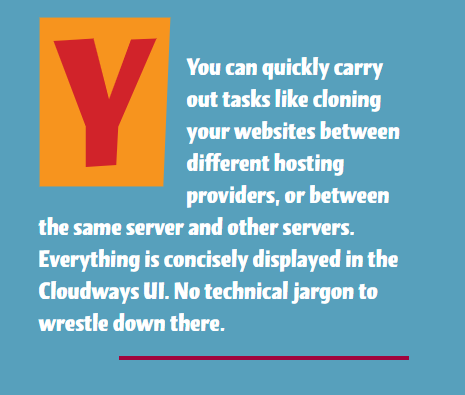You want it to be easy to use, to provide you with as much automated maintenance as possible and... up to 100% uptime. So, what's the best Drupal managed hosting solution for your needs?
And, let me guess: your “feature wishlist” is a bit longer actually:
- autoscaling capability
- multi-site support: you want to be able to manage all your Drupal websites from a single dashboard
- CDN
- backups and easy restores on a daily basis
- support for migration
Given your list of requirements, what are your best choices here?
I've done my research and narrowed down your options to 4.
4 fully managed hosting solutions for Drupal that you should consider first.
Here they are:
But First: Why Managed Hosting? What Does It Really Get You?
Why would you want to go for a fully managed hosting solution for your Drupal website(s) instead of a... self-managed one?
Because:
- you gain so much time; time that you'd otherwise invest in setting the Drupal infrastructure yourself, from the ground up
- you avoid the risk of getting tangled up in software installation, configuration, infrastructure management (which can turn into a time and energy-consuming ordeal even if you have the know-how to set up a scalable VPS on AWS yourself)
- you avoid the headache of maintaining a whole infrastructure of Drupal sites
- you get remote administration that covers mundane, regular operations such as module updating
In short: you delegate your managed hosting provider with everything outside the codebase.
Why spend time on the ongoing maintenance of your website when you can invest it in... improving it? In growing it?
Disclaimer: it's the Drupal hosting that we are using here, at OPTASY.
But is Pantheon the best solution for your own use case? For your expectations of a hosting platform?
It is if it's a simplified, easy to use hosting solution that you need for your Drupal website(s). One that provides you with:
- great support
- solid tooling
- almost instant patching
- great developer experience
- ease of use with Drupal
- high availability and scaling
- intuitive interface, which makes migrating and cloning your Drupal websites so much easier
- lots of integrations
But let's see precisely what services it provides you with.
Pantheon Drupal's Key Features
- php7
- Git
- 24/7 Drupal support
- Once-click core updates
- Built-in stagging environments: dev, test, live
- Global CDN
- Solr
- Developer dashboard
2. Acquia, One of the Best Drupal Managed Hosting Solutions
Acquia Drupal hosting is another great option to consider when you're trying to figure out which is the best service for you.
Why? Because it provides you with:
- some of the best tools: both powerful and easy to use
- enterprise-level security
- cloud hosting specifically tailored to suit Drupal websites
- unmatched scalability: Acquia Drupal 8 hosting powers some of the largest Drupal websites in the world
Acquia Drupal Hosting Key Features
- Enterprise-grade security and recovery: a whole set of firewall controls and access and authentication controls; Acquia-hosted websites are known to be better equipped to recover from cyber attacks
- A hosting platform optimized for Drupal exclusively
- A turnkey solution: the built-in Node.js support enables you to develop your Drupal back-end apps, as well as your server-side rendered front-end apps, on the same hosting platform
- Robust development tools: APIs, integrations, and command-line tools that help you build and optimize your apps in no time
- Real-time monitoring, analyzing, and troubleshooting
- Close to 100% uptime: Drupal hosting Acquia makes the best choice for you if your uptime and performance requirements are way beyond basic
- Centralized dashboard for all your websites and a unique Drupal codebase

Source: acquia.com
Another popular hosting option for Drupal websites is Siteground, a platform robust enough to withstand the challenges of user-heavy, high traffic sites.
It's also the most versatile managed hosting solution on this list, for it meets the needs of both small website owners and enterprise and large organizations.
But why would you choose if over other Drupal 8 hosting services?
SiteGround Drupal 8 Hosting Key Features
- Daily backups
- 1-Click Drupal installation
- Responsive support from actual Drupal developers by mail, chat, helpdesk ticket
- Dynamic NGINX caching (available only on some of the hosting plans)
- Website transfer assistance with zero downtime
4. Cloudways Managed Drupal Cloud Hosting
Cloudways is not just one of your best Drupal managed to host options. It's also one of the most... different.
It allows you to choose the cloud hosting provider for your Drupal infrastructure. You're free to go for Amazon AWS or Digital Ocean, Google Cloud or maybe Vultr, you name it.

Why cloud hosting?
Because it's easier to scale, more cost-effective, and faster.
In short: it's top performance hosting that scales that you get with Cloudways.
But there are also other strong reasons why you'd want to choose to host your Drupal website(s) on Cloudways.

Cloudways Managed Drupal Hosting Key Features
- Composer support
- ease of use: just sift through all the different options that it provides you with through an intuitive UI, select the ones that you prefer via quick one-click access, and set up your Drupal website in no time
- HTTP/2 support
- PHP migration support
- Free migration
- SSD-Based Drupal Cloud Hosting
- CloudwaysCDN
- you get to host multiple Drupal websites on one server
- you can add more team members and share server access across your entire team
- built-in caching options
- auto-scalable kyup servers: they downscale and upscale, depending on the amount of traffic on your website(s), with zero downtime
- managed platform: you can spin up servers and deploy your apps in the blink of an eye
Final Word
The key takeaway is that choosing the best hosting services for your Drupal site(s) is crucial.
Imagine that you'd buy yourself a Porsche, but you don't afford a... garage for it. Or its maintenance costs.
See my point? When you run your website on a performance powerhouse like Drupal, you need to look for a hosting platform that can match such a robust setup.
And speaking of keeping your Drupal infrastructure secure and well-maintained, we have an entire team of Drupal experts that you can delegate your time-consuming maintenance tasks to:
- updating Drupal modules
- running security patches as they get released
- monitoring your website's performance
- monitoring it for suspicious activities
- ...
Just drop us a line and let's tailor a Drupal security and maintenance plan to suit your website(s) needs.
Image by kropekk_pl from Pixabay





